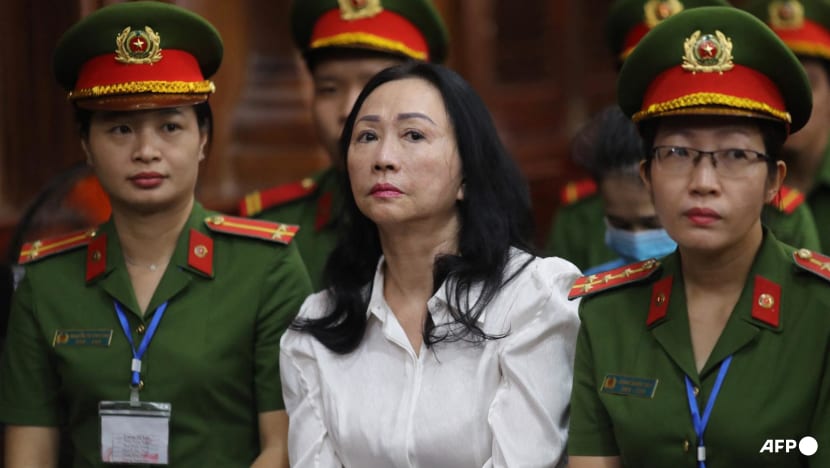CNA Explains: How a death sentence in Vietnam links to a massive anti-corruption drive
CNA’s Tung Ngo looks at Vietnamese tycoon Truong My Lan’s billion-dollar fraud case and the wider implications of the Communist Party’s “blazing furnace” graft crackdown.

Vietnamese property tycoon Truong My Lan (centre) looks on at a court in Ho Chi Minh City on Apr 11, 2024. (Photo: AFP/STR)

This audio is generated by an AI tool.
HANOI: Vietnam continues to reel from the fallout of its largest financial fraud case ever, which has led to real estate tycoon Truong My Lan being sentenced to death and put a spotlight on problematic practices in the banking sector.
The case involves some US$27 billion and 42,000 victims. Its exposé also marks a high point in an anti-corruption campaign dubbed “blazing furnace” and overseen by the Communist Party of Vietnam.
Who’s been caught?
The graft crackdown has resulted in forced resignations of Vietnamese presidents and government leaders, as well as jail time for top officials and businessmen.
But Lan is the first businesswoman to face the death penalty - and also the most high-profile case to date.
The 67-year-old went from helping her mother sell cosmetics at a market stall to helming one of the biggest real estate brands in Vietnam, Van Thinh Phat Holdings Group. It has been a poster firm for attracting investors and contributing to economic growth.
Key to Lan’s rise to power was the Saigon Joint Stock Commercial Bank, also known as SCB, where prosecutors say she held a more than 91 per cent stake through auxiliaries.
Over a decade leading up to her 2022 arrest, Lan lent herself US$44 billion in illegal loans from the bank, to finance Van Thinh Phat’s projects. She did this by utilising hundreds of shell companies and collateral assets with inflated valuations.
Lan has repaid parts of the loans but still needs to front up the remaining US$27 billion on top of her death sentence. She’s also set to stand trial for separate charges of money laundering and fraudulent bond issuance.
Lan’s schemes were made possible by corrupted officials: A former inspector at Vietnam's central bank was sentenced to life in prison for taking US$5.2 million in bribes to ignore the wrongdoings at SCB.
With her vast wealth and influence, Lan also had close connections in Vietnam’s political circles, and is widely considered to be allied with former Communist Party leaders – specifically those previously punished by the ruling faction for a variety of wrongdoings prior to her own fraud case coming to light.
"The case could be just the tip of the iceberg that has been broken," said Pham Van Hoa, a delegate of Vietnam's lawmaking body in November. “There may be other icebergs that have not been broken.”
What's been the fallout?
SCB, Vietnam’s largest by assets, misled 83-year-old Ho Thi Le Hang into buying fraudulent bonds under Lan’s Van Thinh Phat Holdings Group.
One of an estimated 42,000 victims, Hang hopes to get back the US$500,000 - all of her life savings, raised from selling two plots of her ancestors’ land - she parted with. While some bond issuers have defaulted their debt obligations, the rest of the bonds have been frozen.
After Lan’s arrest in October 2022, Vietnam's central bank placed SCB under special supervision to stop a run - that is, customers were withdrawing their money in fear of the commercial lender’s potential failure.
This week, it was reported that the central bank had pumped US$24 billion in special loans as of the beginning of April, in a bid to prevent SCB from collapsing. That’s equivalent to one-fourth of the country's foreign exchange reserves.
Meanwhile, insiders have expressed concerns over how underlying problems in Vietnam’s banking sector have gone unnoticed.
From 2012 to 2020 SCB passed, without red flags, audit checks by local offices of top global firms including Ernst & Young, Deloitte and KPMG. Yet after Lan’s fraud was exposed, separate audits showed more than US$18 billion in accumulated losses.
Her case has also highlighted the issue with “cross-ownership” in Vietnam's banking sector, where private businesspeople - including real estate developers like Lan - also hold key positions at commercial banks, effectively using them as personal ATMs.
"Financial institutions need to put an end to the practice of providing loans to specific companies, projects in its own ecosystem or backyard firms under the same group that would endanger the healthiness and safety of the bank," Vietnamese Prime Minister Pham Minh Chinh said in December.
Vietnam has since amended laws to strengthen shareholder limits at banks. But experts say regulation alone is not enough in the absence of effective enforcement.
“There is no guarantee that it will be the last case … Violators have bypassed the laws easily,” Dr Nguyen Tri Hieu, a banking insider, told CNA. “I am not surprised at the fraud. But I am surprised at the magnitude of it.”
Why is Vietnam stoking this “blazing furnace”?
The fall of Lan and her financial empire is part of a long-running, unprecedented anti-corruption crackdown led by Nguyen Phu Trong, general secretary of the Vietnam Communist Party.
Trong, a staunch communist theoretician, views corruption as the gravest threat to the regime’s survival and has vowed to conduct his campaign “without no-go zones and exceptions.”
“The anti-corruption campaign plays a very important role in enhancing the image of the Communist Party,” Nguyen Khac Giang, a visiting fellow at the ISEAS-Yusof Ishak Institute think tank, told CNA.
"It doesn't really bode well with the popular understanding of the party (when) you see so many high-profile officers being corrupted."
What’s been the impact on Vietnam?
The crackdown and its clean-ups - including the threat of - have generated slowdowns in the bureaucratic system and disruptions in critical services, said Giang.
And Lan’s case in particular may have served to highlight lax government oversight of financial systems, possibly affecting confidence in doing business in Vietnam.
Investors may be further unnerved by the political turmoil and infighting that experts say the anti-graft drive has become a tool for.
All this, at a time when Vietnam is struggling to maintain economic growth targets.
But John Rockhold, chairman of the Power and Energy Working Group at the Vietnam Business Forum, told CNA: “We see the government’s actions in anti-corruption and cleaning things up as a positive move.
“A lot of people are saying they are more nervous about moving forward and making a mistake, and that it’s better maybe to sit back and wait and let things work out.”
















